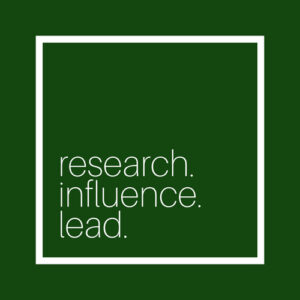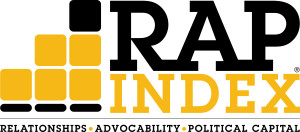Innovate to Motivate (I2M) was created in 2002 to address the needs of veteran political engagement professionals. We knew then, and believe today, that optimal government relations results derive from an evidence-based culture, application of scientific influence principles, and personal leadership. The biennial I2M conference is conducted in odd-numbered years, and we conduct shorter learning experiences in election years. Research. Influence. Lead. 2018 (RIL) is a one-day conference designed to emphasize the research, influence, and leadership disciplines that are critical to today’s government relations professional in a fast-paced, one-day format.
As with our I2M conference, serving as an RIL faculty member is a competitive process. Our Advisory Committee considers presentation proposals for certain topics and votes to determine the most deserving submissions.
![]()
As a CAE Approved Provider educational program related to the CAE exam content outline, this program may be applied for 6 credits toward your CAE application or renewal professional development requirements. Note: Applicants may use any program that meets eligibility requirements in the specific time frame towards the exam application or renewal. There are no specific individual courses required as part of the applications – selection of eligible education is up to the applicant based on their needs.
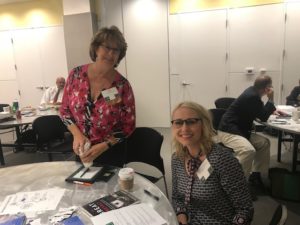
Jeana Hultquist (L) of American AgCredit and Lauren Sturgeon (R) of CoBank
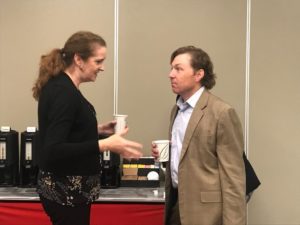
Kameran Onley, Director of Government Affairs at The Nature Conservancy, talks with RIL faculty member Brad Todd, co-author with Selena Zito of “The Great Revolt.”
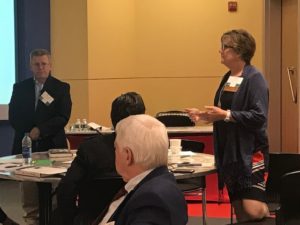
Faculty member Dr. Craig Fleischer (L) guides a discussion with Wendy Schrag, VP of State Government Affairs for Fresenius Medical Care, government relations innovations.
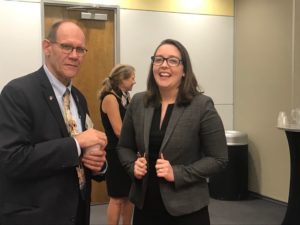
J. C. Chamberlain and ASAE VP of Public Policy Mary Kate Cunningham. J.C.’s stirring presentation on his “lessons learned” after a near-death bicycle crash kept our audience spellbound.
OUR 2018 RESEARCH. INFLUENCE. LEAD. FACULTY
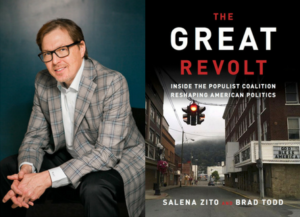
Brad Todd, author, The Great Revolt
The Great Revolt
Come hear from someone who did the shoe leather research to ascertain the myth v. the reality of the “Trump voter.” The Great Revolt (Penguin Random House) marries on-the-ground investigation with the hard data analysis of electoral trends. The book reveals that the pivotal voters who unexpectedly turned the 2016 election had been hiding in plain sight—ignored by both parties, the media, and the political experts all at once. Deeply rooted themselves in the work-based, faith-driven traditional culture of the nation’s interior states, Brad Todd and his co-author, Salena Zito, examine and reframe the discussion of the “Trump voter” to answer the question: What’s next?
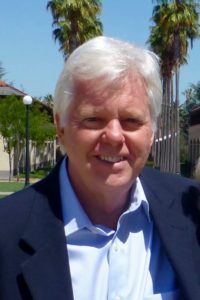
Dr. Robin Vallacher, Florida Atlantic University
Influence: How and Why Minority Opinion is Decisive During Rapid Social Change & How to Leverage it In Your Favor
Social systems—from organizations to societies—are undergoing significant changes today that are rapid, complex, and often unanticipated. Norms, beliefs, and traditions that have withstood the test of time and seemingly were permanent fixtures within a social system have been challenged and up-ended in often astonishingly short periods of time, giving way to new ideas that had been in the minority.
As influence agents, government relations professionals need to understand the defining features of such transitions beyond sound bites and common punditry. In this workshop, you’ll hear from a national expert in minority group opinion influence who will share:
- Why rapid changes in psychological and social systems represent phase transitions, analogous to the qualitative changes observed in physical systems, such as the transition from water to steam.
- The latent power of a minority opinion to displace a long-standing majority opinion.
- Dr. Vallacher’s social transition computer model on societal attitudes and norms, and its validation against the dramatic transformation experienced in Eastern Europe in the late 1980s after the collapse of the Communist empire.
- Because the social transition model trades on basic dynamic processes rather than the idiosyncratic social, historical, and economic factors associated with each instance of social change, it provides a perspective that is scalable and thus relevant to the understanding—and the potential control—of change at all levels, from work groups and corporations to societies and international relations.
Robin Vallacher is Professor of Psychology at Florida Atlantic University. He is also a Research Associate in the Center for Complex Systems, University of Warsaw, Poland, and a Research Affiliate in the Advanced Consortium on Cooperation, Conflict, and Complexity at Columbia University.
His research spans a wide range of topics, from intrapersonal processes (self-concept, self-regulation) to interpersonal dynamics (social judgment, social interaction, social influence) and societal issues (social justice, social change, political polarization, intergroup conflict). He has received funding for his research from the National Institute of Mental Health, the National Science Foundation, the Polish Science Foundation, the Max-Planck Institute for Psychological Research, and the James S. McDonnell Foundation. Dr. Vallacher and his colleagues were among the first to reframe the subject matter of personality and social psychology in terms of complexity science, with today he is widely recognized as a leader in this redirection of the field.
Dr. Vallacher has authored or edited 8 professional books and written over 100 book chapters and journal articles. He has presented the results of his research in over 150 national and international conferences, and has delivered invited addresses at over 20 universities in the United States and Europe. In recent years, Dr. Vallacher and his colleagues at Columbia, University of Southern California, and Warsaw University have adapted principles and methods from complexity science and dynamical systems to investigate a wide range of topics in personality and social psychology, including self-concept, self-regulation, mindfulness, social judgment, social influence, close relationships, stereotyping and prejudice, sport psychology, social change, political polarization, and international conflict.
Dr. Vallacher has been a Visiting Scholar at University of Texas at Austin; University of Bern, Switzerland; Max Planck Institute for Psychological Research in Munich, Germany; and University of Montpellier, France.
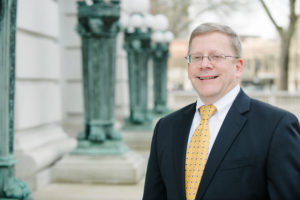
Dr. Craig Fleisher, Chief Learning Officer, Aurora WDC
Developing Asymmetric Insights for Achieving More Powerful Strategy
Don’t be caught by surprise — there are tools, methods and techniques to create early warning systems in your operations. Dr. Fleisher will share how to gain an asymmetric advantage as you look around the corner and over the horizon to spot trends that matter to your government relations strategy.
This interactive workstorm will help audience members to think, plan about, and create their and their organization’s future in new and more powerful ways. As has been attributed to Abraham Lincoln, the best way to shape your future is to create it. Dr. Fleischer’s career research, which now spans three decades in the field of managing public affairs and government relations, has been focused on helping organizations develop pathways to both meet their own business and non-market goals while
simultaneously generating net positive societal benefits.
His research and experience with hundreds of organizations in North America and abroad has allowed him to identify several uniquely powerful tools and techniques (T&T’s) that have empirically generated net benefits. He will be collaborating with the audience, working through several T&T’s in providing a taste of how you can take these back to your workplaces after the conference to help your leadership and colleagues achieve new breakthroughs and results.
Craig S. Fleisher, Ph.D., is the Chief Learning Officer (CLO) at Aurora WDC, Madison, WI, one of the globe’s leading intelligence professional service firms. A prolific author/editor of 14 published books and 150+ scholarly papers & chapters, Craig’s research has been included in numerous professional certification qualifying and licensing exams. Both in classrooms and boardrooms, his ideas, methods, and principles such as Analytic Fitness, KITs+1, Intelligence Analysis 3.0, FAROUT, and Intelligence-driven Innovation are presented internationally and regularly validated in dialogues & application with accomplished executives and top students. Among the top-cited Google Scholars in several subjects, Craig has been quoted in prominent international business media and advised associations, public agencies, think tanks & highly respected brands including 3M, ExxonMobil, GE, GM, J&J, Levi Strauss, Merck, and Proctor and Gamble.
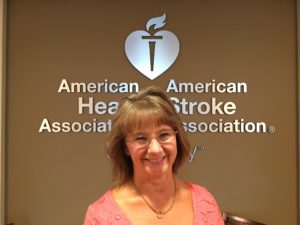
Betsy Vetter, Field Grassroots Director, American Heart Association
Your Legislator Champions – Leading the Good, the Bad, and the Ugly
Policy champions are important to the success of issue campaigns. But they aren’t all created equal. Don’t be a victim of weak legislator champions! In this session we will look at legislator champions and how to lead them. In this session, you’ll learn:
- how to work with the champion that is strong and owns the issue but maybe doesn’t always see where you fit in to the campaign;
- nuances of leading the weak champions —the ones who say they will sponsor the bill but fails to let you know what is happening and,
- coaching tactics for the champion that loves the issue, but is a policy novice.
Through an exploration of successful executed campaigns, we will uncover common themes and top tips for making sure whatever kind of champion you have, you can help them help you to win your campaign.
Betsy Vetter is the Regional Vice President of Government Relations for the American Heart Association/American Stroke Association Mid-Atlantic Affiliate where she has been an employee since 2002. In her role, she directs the AHA advocacy program in North Carolina as well as managing the affiliate-wide grassroots program and providing consultation on all local policy campaigns.
Under her leadership, the Affiliate You’re the Cure network has become a strong force for policy change. Volunteer engagement is her passion and she has helped advocates achieve national recognition for their efforts. Betsy has led successful policy campaigns including NC’s smoke-free restaurant and bars law, CPR in schools, pulse oximetry screening for all newborns, stroke center designation, transportation funding, and early childcare education guidelines for agencies and homes. Most recently she helped local advocates in Augusta, GA successfully pass a comprehensive smoke-free ordinance.
Betsy is a student of numerous advocacy and grassroots courses offered by the AHA, Voices for Healthy Kids, The Showalter Group and M&R Strategies. Her AHA honors include the Grassroots Innovation Award, Award for Advocacy Excellence, Media Advocacy Campaign of the Year and the Campaign Manager/Lobbyist of the Year Award. Betsy has also been recognized for her advocacy efforts by Prevention Partners, NC Alliance for Athletics, Health, Physical Education, Recreation, Dance, and Sports Management, and the NC Stroke Association.
A native of Pennsylvania, she has lived in North Carolina since 1985. Betsy is married to the love of her life, Joe, and has three daughters, three grandchildren, and two fur babies, Lil Mo and Yogi. In addition to her work, Betsy enjoys visiting the coast, is an avid reader, and loves various needle crafts. Currently, Betsy splits her time between Raleigh and Southport.
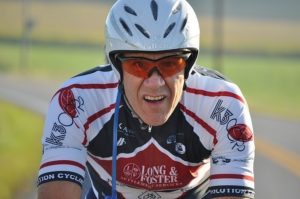
John (JC) Chamberlain, Vice President Sales, KnowWho.com
What’s Your Bank Balance? Building Resilience Into Your Work and Personal Life
Life experiences inform us in ways our work life cannot. A near death encounter with a car while cycling on a country road left John (J.C.) Chamberlain in trauma care for 7 weeks. Because of a deep well of fitness and community support, he survived. The central lesson was consciously deciding to mitigate instead of litigate. This enabled JC to recover and become stronger. In short, this opened in him a new resilience, helping him to cope better with the rest of his life. The accident resulted in a significant physical setback. Yet it revealed to him a new path toward wellness and balance. JC will explore with you seven key “banks” where you can make deposits to improve outcomes in your work and personal life. You will select a “bank,” identify where you are out of balance (or bankrupt), and define ways to get in balance. Then we will explore what the future holds for you in the relevant context of your selected “bank.”
For the past 5 decades John C. Chamberlain has engaged and connected community groups and businesses with his leadership and strategic thinking. A serial entrepreneur since his youth, he currently advises early stage enterprises how to form and grow into scaled mass market operations. He attended Andover and Princeton where his academic focus was on the human intersection with technology. This theme continues to intrigue him through ventures that leverage technologies to make lives better. He is a popular public speaker and for the past 20 years has specialized in providing software solutions for citizen engagement in legislative advocacy.
Chamberlain has managed billion-dollar commercial real estate, and a helped to run a global nonprofit with students in 31 countries. His unique branding, marketing and sales approach as resulted in record-setting sales. His convergent thinking creates refreshing solutions to long-standing unsolved problems. His sense of proportion and practical implementation skills have inspired his clients to gain and hold the leading edge of their markets. He is a 5-time national champion in rowing and cycling holding records in both sports. He has ridden 330,000 miles on his bicycle since 1970, and walked 1,300 miles of the Appalachian Trail, summited Mt. Rainier, Matterhorn, Jungfrau, and Long’s Peak. He has played violin for 54 years.
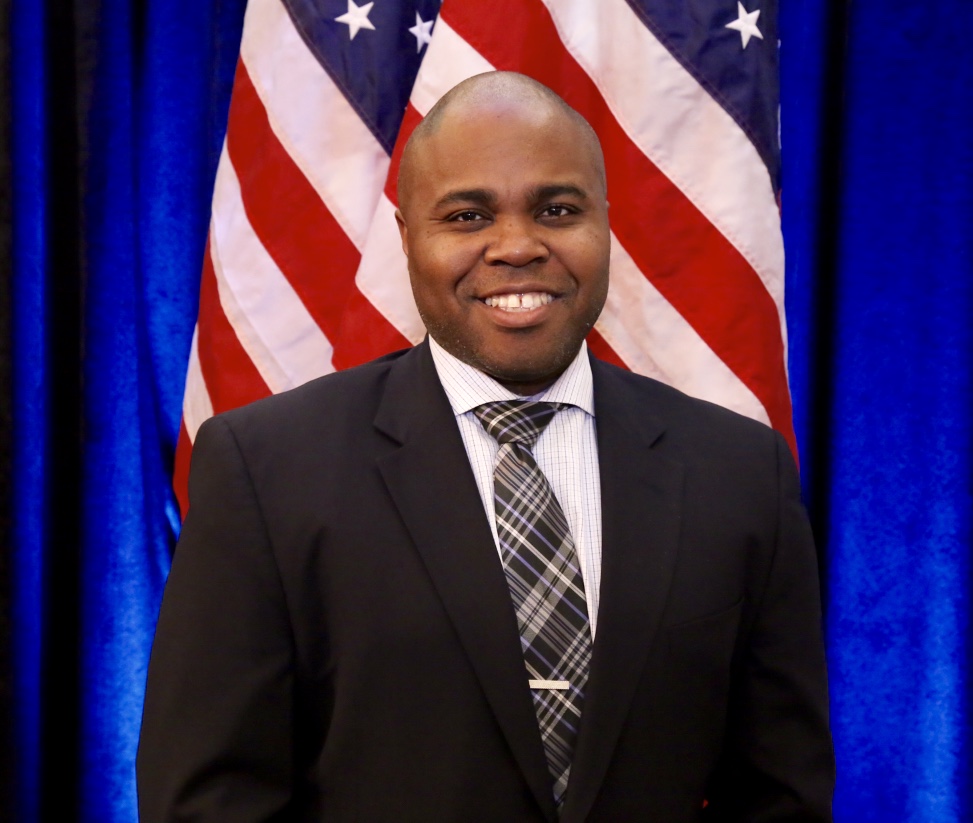
Davon Gray, Manager of Political Programs, College of American Pathologists
Leadership: Leading Stakeholders for the Long Term by Making the Political Personal
Influencing stakeholders requires finding a connection between what people already care about, and what you want them to do. Advocate leaders face challenges from our advocates’ various career and life changes, as this affects their level of involvement. In a time when there are so many ways to use social media to get people involved in advocacy, it’s still difficult to keep advocates motivated beyond your rally or Capitol Hill fly-in. Davon will share, from his twenty years of experience in the political engagement arena, how to find out what motivates your advocates, and how to translate that into extended commitment by focusing on what motivates them in their careers and lives. Find out how he:
- Quadrupled participation in an annual event by listening to how his members talked about the event
- Increased by 100% member participation in facility tours for Members of Congress by leveraging the career path of certain members
- Uses the RETA method to provide clarification for members who are ambivalent about advocacy
Davon Gray has amassed an extensive career in Washington, D.C., over the past nineteen years, where he has worked in government and political affairs and as an Army officer in the National Guard. Mr. Gray has a Bachelor of Science degree in Political Science from the University of Southern Mississippi and a Master’s degree in Public Administration with an emphasis in Health Care Management from DeVry University. He also attended the Thomas Sorensen Institute Fellowship for Political Leadership at the University of Virginia.
Davon’s grassroots/government affairs experience has involved acquiring appropriations for hospitals, community health centers, and educational organizations. He has worked in a bipartisan manner with members of Congress, their staffs, and affiliated organizations to accomplish legislative goals. His bipartisanship has extended to working on three presidential campaigns, Democrats and Republican. Davon is often invited to be a guest lecturer at national organizations and at universities to speak on the importance of grassroots, coalition building, and political involvement.
Davon served as the National Coordinator for Health Care Professionals for the presidential campaign of Senator John McCain (R-AZ), and he was recently appointed to the Prince William County Board of Equalization (board on tax assessments) by Supervisor Maureen Caddigan (R).
Davon has worked for several health care organizations, including the American Hospital Association in the political action committee department, and currently serves as the manager of Political Programs for the College of American Pathologists, where he manages the College’s political action committee, PathPAC.
Davon is also an ordained minister at Grace Church in Dumfries, Virginia, where he teaches on subjects related to spiritual growth, the importance of family, and leadership. He lives in Manassas, Virginia, with his wife of 22 years, Sherri, and their two daughters, Ashley and Lauren.

Brett G. Kappel, Partner, Government Affairs and Public Policy, Akerman
Disclaimers, Disbursements and Court Decisions: Troubling New Developments at the FEC
Grassroots and PAC Town Hall®
Join Brett for the latest “around the corner” look at the FEC’s recent activities, including:
- The FEC is considering whether to require disclaimers on online political advertisements, but Facebook, Google and Twitter have each developed their own rules that far exceed anything the FEC is considering adopting.
- The number of incidents of unauthorized disbursements from major corporate PACs has increased sharply, with four well-known corporate PACs reporting tens of thousands of dollars in thefts in the first half of 2018. We’ll discuss what you can do to protect your PAC’s bank account from thieves.
- Finally, the U.S. District Court for the District of Columbia recently invalidated a FEC regulation that minimized the reporting requirements for nonprofit organizations making independent expenditures. We’ll discuss how the FEC is responding to that court decision and whether it will require nonprofits to disclose much more information about their donors.
We’ll conclude with our Innovate to Motivate PAC and Grassroots Town Hall led by I2M Founder and Producer, Amy Showalter.
With extensive experience in political law, Brett Kappel works with clients to navigate complex federal and state laws and regulations governing campaign finance, lobbying, and government ethics. His clients include corporations, trade associations, Members of Congress, candidates for public office, political action committees, and Super PACs. Brett has served as legal counsel to three Presidential campaigns, six Senate campaigns and dozens of House campaigns. A regular commentator on campaign finance issues, Brett’s insights have been featured in such national publications as The Washington Post, The New York Times, The Wall Street Journal, The Miami Herald, The Chicago Tribune, Politico, The Hill, and Roll Call.
Brett has represented clients in Federal Election Commission (FEC) enforcement proceedings, rulemakings, and the advisory opinion process. He has represented numerous clients with Matters Under Review (MURs) before the FEC and has experience negotiating conciliation agreements. In addition, he advises clients on the development of government relations programs, including the creation and operation of political action committees and other ancillary tax-exempt organizations. He has lobbied Congress on numerous issues, including financial services, intellectual property, aviation, and energy.
CO-HOSTS
Research. Influence. Lead. is produced and founded by:

We specialize in helping organizations that need to galvanize their volunteers, PAC prospects and staff to advance their cause in the legislative process.
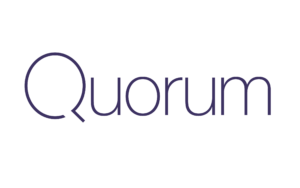
Quorum is a public affairs software platform that enables organizations to launch grassroots advocacy campaigns, manage stakeholder engagement, and monitor Washington, Brussels, all 50 states, and thousands of cities around the country.
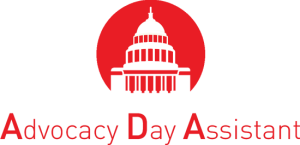
Running an advocacy day is beyond stressful, but with the Advocacy Day Assistant App you’ll be able to coordinate and schedule meetings with ease, stay in constant contact with your advocates and get real-time feedback all in the palm of your hand.

